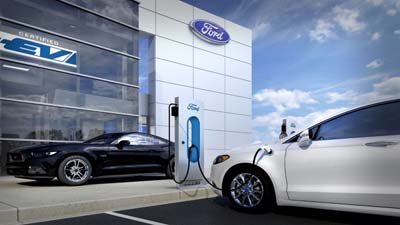Despite growing interest, a gap exists between consumer enthusiasm for electric vehicles (EVs) and their actual purchasing decisions, according to new research released June 27 by Cox Automotive.
The 2023 Path to EV Adoption: Consumer and Dealer Perspectives study also reveals a lack of EV readiness among U.S. automotive dealers regarding sales and service. As EV inventories continue to climb, dealers must bridge this gap.
"Education for both consumers and dealers remains a critical factor in driving widespread confidence and adoption of electric vehicles," said Kayla Reynolds, manager of research and market intelligence, Cox Automotive Mobility. "For dealers specifically, preparation is paramount, and our findings emphasize the urgency of equipping dealers with EV sales and servicing capabilities to meet the needs and demands of EV buyers."
The Cox Automotive study, available for download, surveyed 1,024 consumers and 152 dealers, comparing data points from electric vehicle research conducted by the company over the last several years.
Key Takeaways
EV Consideration Grows Rapidly, Sales More Slowly
Cox Automotive is forecasting 1 million new EVs will be sold in the U.S. in 2023, a record and more than twice the volume sold in 2021. The industry's sales growth has been powered not only by Tesla's rapid expansion, but also a flow of new products into the market---33 new EVs are being launched in 2023 alone, according to estimates from Kelley Blue Book, a Cox Automotive company. More than 50 additional new or updated EVs will be launched in 2024.
According to Cox Automotive research, 51% of consumers are now considering either a new or used EV, up from 38% in 2021. Still, while interest in EVs rapidly increases, the gap between consideration and sales remains wide. EVs will account for less than 8% of total new-vehicle sales in 2023. On the used side, EV share of the total market remains approximately 1%. In many parts of the country, new EV inventory levels are increasing, as products arrive more quickly than consumers buy. In June, EV days of supply---a measure of inventory levels in the U.S.---was approaching 100 days, nearly twice the industry-wide average. As the Cox Automotive study shows, EV consideration is well ahead of sales.
Affordability continues to the top obstacle for EV buyers, with 43% of intenders noting EVs are too expensive, up slightly from the level in 2021. Other barriers, however, are falling. In 2021, 40% of intenders cited a lack of charging stations as a top roadblock. That number has fallen to 32%.
Future EV Readiness Gap
There is a significant gap in readiness between consumers and dealers in terms of embracing electric vehicles. According to the survey, 53% of consumers feel EVs are the future and will largely replace gas engines over time, compared to only 31% of dealers. Nearly half (45%) of dealers surveyed feel EVs still need to prove themselves in the marketplace. While consumer adoption of EVs is expected to soar as more models hit the market, dealerships are not prepared regarding sales and service capabilities, raising concerns about the overall customer experience and satisfaction. According to the survey, 82% of dealers are required by their OEM to make an EV investment. This should help dealers build the infrastructure needed to support EV growth.
OEM Support Needed
Despite concerns, dealers see EVs as important to the growth of their dealerships, both in selling (55%) and servicing (57%) EVs. However, the study revealed dealerships need more support and guidance from automakers, which they view as their preferred source of EV information. Dealers are thirsty for comprehensive and up-to-date information to ensure they become the go-to resource for customers, specifically in areas of charging infrastructure and battery technology. According to the study, areas where dealers need to learn more about EVs include the battery lifecycle, battery health and overall servicing of an electric vehicle. According to the survey, this is consistent with EV owners, who also showed an interest in learning more about battery health.
Crucial Need for Equipping Dealerships
While the likelihood of an EV buyer deciding to purchase before visiting a dealership is high, current EV owners still prefer dealerships for servicing and maintenance. Unfortunately, more than half of the dealerships surveyed are not fully prepared to handle the specific needs of EVs. Feedback collected from dealers who took the survey noted more infrastructure for DC fast chargers and more technicians dedicated to BEVs are needed. This preparation will be essential, as among dealers who do not currently sell EVs, 55% are expecting to begin in the next year and 34% within the next six months, according to the study.
Source: Cox Automotive











